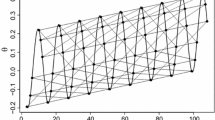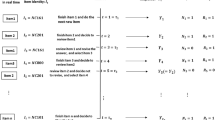Abstract
Item response theory posits “local independence,” or conditional independence of item responses given item parameters and examinee proficiency parameters. The usual definition of local independence, however, addresses the context of fixed tests, and initially appears to yield incorrect response-pattern probabilities in the context of adaptive testing. The paradox is resolved by introducing additional notation to deal with the item selection mechanism.
Similar content being viewed by others
References
Birnbaum, A. (1968). Some latent trait models and their use in inferring an examinee's ability. In F.M. Lord & M.R. Novick,Statistical theories of mental test scores. Reading, MA: Addison-Wesley.
Chang, H., & Ying, Z. (in press). Nonlinear sequential designs for logistic item response theory models, with applications to computerized adaptive tests.Annals of Statistics.
Lord, F.M. (1980).Applications of item response theory to practical testing problems. Hillsdale, NJ: Erlbaum.
Lord, F.M., & Novick, M.R. (1968).Statistical theories of mental test scores. Reading, MA: Addison-Wesley.
Mislevy, R.J., & Wu, P.-K. (1996).Missing responses and Bayesian IRT ability estimation: Omits, choice, time limits, and adaptive testing (Research Report RR-96-30-ONR). Princeton, NJ: Educational Testing Service.
Owen, R.J. (1975). A Bayesian sequential procedure for quantal response in the context of adaptive mental testing.Journal of the American Statistical Association, 70, 351–356.
Rubin, D.B. (1976). Inference and missing data.Biometrika, 63, 581–592.
Wainer, H., Dorans, N.J., Flaugher, R., Green, B.F., Mislevy, R.J., Steinberg, L., & Thissen, D. (1990).Computerized adaptive testing: A primer. Hillsdale, NJ: Lawrence Erlbaum Associates.
Author information
Authors and Affiliations
Corresponding author
Additional information
We are grateful to Charlie Lewis, Ming-Mei Wang, and Pao-Kuei Wu for discussions on this topic, and to the Editor, the reviewers, and Howard Wainer for helpful comments on an earlier version of the paper. The first author's work was supported in part by the National Center for Research on Evaluation, Standards, Student Testing (CRESST), Educational Research and Development Program, cooperative agreement number R117G10027 and CFDA catalog number 84.117G, as administered by the Office of Educational Research and Improvement, U.S. Department of Education.
Rights and permissions
About this article
Cite this article
Mislevy, R.J., Chang, HH. Does adaptive testing violate local independence?. Psychometrika 65, 149–156 (2000). https://doi.org/10.1007/BF02294370
Received:
Revised:
Issue Date:
DOI: https://doi.org/10.1007/BF02294370




